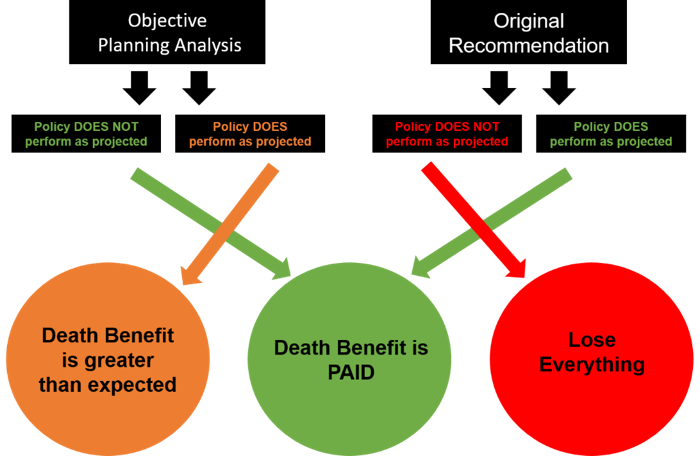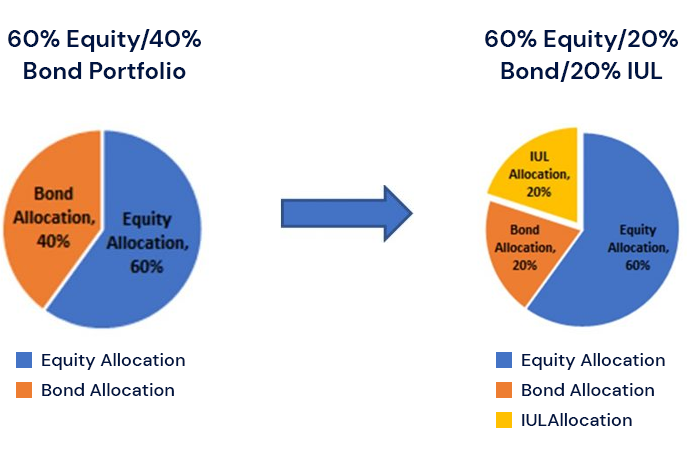All Categories
Featured
Table of Contents
Do they contrast the IUL to something like the Vanguard Total Stock Market Fund Admiral Shares with no load, an expenditure ratio (ER) of 5 basis factors, a turn over proportion of 4.3%, and a phenomenal tax-efficient record of distributions? No, they compare it to some terrible proactively handled fund with an 8% tons, a 2% ER, an 80% turn over proportion, and a dreadful document of temporary resources gain circulations.
Shared funds commonly make annual taxable distributions to fund owners, even when the worth of their fund has actually dropped in worth. Common funds not only call for earnings reporting (and the resulting yearly taxes) when the shared fund is rising in worth, yet can also enforce earnings tax obligations in a year when the fund has gone down in value.
That's not exactly how shared funds function. You can tax-manage the fund, harvesting losses and gains in order to reduce taxable circulations to the investors, yet that isn't somehow mosting likely to transform the reported return of the fund. Just Bernie Madoff kinds can do that. IULs prevent myriad tax traps. The ownership of mutual funds might require the common fund owner to pay approximated taxes.

IULs are easy to position to ensure that, at the proprietor's fatality, the beneficiary is exempt to either income or estate taxes. The exact same tax obligation decrease strategies do not work almost too with shared funds. There are many, typically pricey, tax obligation catches associated with the timed trading of shared fund shares, catches that do not relate to indexed life insurance policy.
Chances aren't very high that you're going to be subject to the AMT as a result of your shared fund distributions if you aren't without them. The rest of this one is half-truths at finest. While it is true that there is no income tax due to your successors when they inherit the profits of your IUL plan, it is additionally true that there is no income tax due to your successors when they acquire a shared fund in a taxable account from you.
Maximum Funded Tax Advantaged Insurance Contracts
There are much better methods to stay clear of estate tax obligation problems than getting investments with low returns. Common funds may cause earnings taxes of Social Safety and security advantages.

The development within the IUL is tax-deferred and might be taken as tax obligation totally free earnings using finances. The policy owner (vs. the mutual fund manager) is in control of his or her reportable earnings, hence allowing them to lower or perhaps get rid of the tax of their Social Security advantages. This one is terrific.
Below's an additional very little issue. It's real if you acquire a shared fund for claim $10 per share prior to the distribution date, and it disperses a $0.50 distribution, you are after that mosting likely to owe tax obligations (possibly 7-10 cents per share) although that you have not yet had any type of gains.
In the end, it's really concerning the after-tax return, not how much you pay in taxes. You're likewise most likely going to have more cash after paying those taxes. The record-keeping needs for possessing common funds are substantially more complicated.
With an IUL, one's records are maintained by the insurer, copies of yearly declarations are sent by mail to the proprietor, and distributions (if any type of) are completed and reported at year end. This one is likewise type of silly. Of course you should maintain your tax documents in instance of an audit.
Index Insurance
Rarely a reason to purchase life insurance. Common funds are typically part of a decedent's probated estate.
Furthermore, they are subject to the delays and costs of probate. The proceeds of the IUL plan, on the various other hand, is always a non-probate distribution that passes outside of probate straight to one's called recipients, and is therefore exempt to one's posthumous creditors, unwanted public disclosure, or similar hold-ups and expenses.
Medicaid incompetency and lifetime income. An IUL can provide their owners with a stream of earnings for their whole lifetime, no matter of exactly how long they live.

This is helpful when arranging one's events, and transforming assets to earnings prior to an assisted living facility arrest. Mutual funds can not be converted in a similar fashion, and are almost always considered countable Medicaid assets. This is one more stupid one supporting that poor individuals (you know, the ones that require Medicaid, a federal government program for the bad, to pay for their nursing home) should utilize IUL as opposed to shared funds.
Universal Life Insurance Ratings
And life insurance policy looks dreadful when contrasted fairly versus a pension. Second, individuals that have money to buy IUL above and beyond their retirement accounts are mosting likely to need to be awful at handling cash in order to ever before receive Medicaid to spend for their retirement home costs.
Chronic and terminal disease motorcyclist. All policies will enable an owner's very easy access to cash money from their policy, often waiving any abandonment fines when such individuals suffer a serious ailment, need at-home care, or end up being restricted to an assisted living home. Mutual funds do not provide a comparable waiver when contingent deferred sales fees still put on a common fund account whose owner needs to offer some shares to money the expenses of such a keep.
No Lapse Guarantee Universal Life Insurance
Yet you reach pay more for that advantage (motorcyclist) with an insurance plan. What a large amount! Indexed universal life insurance policy supplies survivor benefit to the beneficiaries of the IUL proprietors, and neither the proprietor nor the beneficiary can ever before shed cash because of a down market. Shared funds give no such assurances or fatality advantages of any kind of kind.
Now, ask on your own, do you actually require or want a death advantage? I definitely don't need one after I reach financial independence. Do I want one? I mean if it were low-cost sufficient. Certainly, it isn't affordable. Usually, a purchaser of life insurance policy spends for the true price of the life insurance policy benefit, plus the prices of the policy, plus the revenues of the insurance provider.
Universal Life Comparison
I'm not totally certain why Mr. Morais included the entire "you can not lose money" once more here as it was covered rather well in # 1. He just wished to repeat the most effective marketing factor for these things I mean. Once again, you do not lose nominal dollars, but you can shed genuine dollars, as well as face severe opportunity cost because of reduced returns.

An indexed universal life insurance policy proprietor may trade their policy for a totally different policy without triggering revenue taxes. A common fund proprietor can not relocate funds from one shared fund firm to another without offering his shares at the former (thus setting off a taxed event), and redeeming brand-new shares at the latter, usually subject to sales costs at both.
While it is real that you can trade one insurance plan for an additional, the reason that people do this is that the very first one is such a dreadful plan that even after acquiring a brand-new one and going through the very early, adverse return years, you'll still come out in advance. If they were sold the best policy the initial time, they should not have any kind of need to ever trade it and undergo the early, unfavorable return years again.
Latest Posts
Universal Life Company
Universal Life Insurance Ratings
Universal Life Insurance Comparison